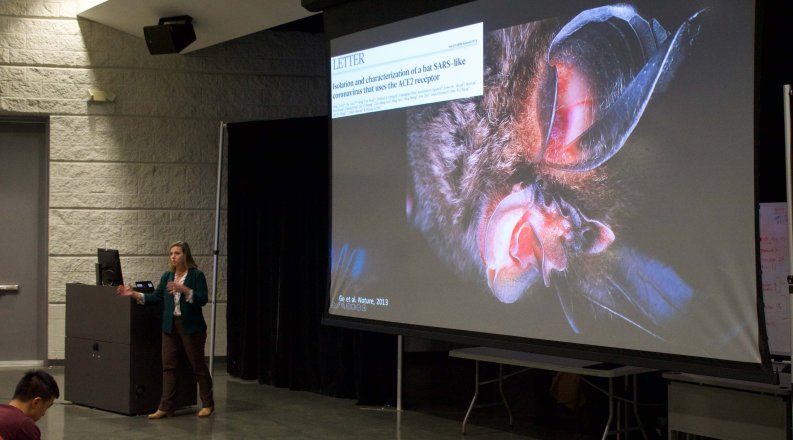By Tiffany Whitfield
Dr. Jonna Mazet, DVM, MPVM, Ph.D. is the Vice Provost of Grand Challenges at the University of California, Davis and was the guest lecturer at the 2024 Daniel E. and Helen N. Sonenshine Endowed Lecture Series in Infectious Diseases. The Sonenshine lecture series is hosted by Old Dominion University’s College of Sciences and the Department of Biological Sciences and features global health experts who share their knowledge about infectious diseases. As a One Health expert she gave two talks at ODU on Thursday, February 8, 2024.
Currently, Dr. Mazet serves as the Chancellor’s Leadership Distinguished Professor of Epidemiology and Disease Ecology and founded the One Health Institute in the U.C. Davis School of Veterinary Medicine. The focus of her research is on global health problem solving, especially for emerging infectious disease and conservation challenges. Her work has taken her to more than 30 countries around the world.
Dr. Mazet’s spoke to ODU students and faculty at her first lecture. The topic of her talk was on “Using One Health to Rank the Risk of Spillovers & Pandemic Potential for Novel Viruses.” Her talk centered around utilizing a One Health approach to emerging health threats including newly appeared or previously viral diseases that are increasing in incidence. She gave examples of various activities that occurred during the COVID-19 global pandemic but concluded with the observation that we have changed nothing to prevent or address things that could be applied to the next pandemic. Students and faculty asked questions at the completion of her talk and Dr. Mazet carefully and thoughtfully answered each and every question posed. Throughout the course of her visit on campus, Dr. Mazet also met with many graduate students. “She provided some excellent mentoring during her talks with the many graduate students interested in One Health in the Department,” said Holly Gaff, chair of ODU’s Department of Biological Sciences.
Later that evening at 7:30 p.m., Dr. Mazet gave a public lecture at the Lê Digital Theater and Planetarium inside the Chemistry Building. Her second talk was titled, “Colliding Crises: The Power of Collaboration for Addressing the Planet's Wicked Problems.” She explained the scope of her work and how she collaborated with people across various groups/disciplines regarding climate change, food systems and emerging health threats. Dr. Mazet indicated that, “to solve these wicked problems we have to work across disciplines and be respectful of each other.” She also discussed how her university (UC Davis) was harvesting the power of the university to tackle these issues. In addition, she discussed how the same (human) behavior plays an important role in causing the wicked problems.
“Being able to bring in top quality researchers such as Dr. Mazet is made possible through the generous support of the Sonenshines,” said Wayne Hynes, Ph.D. associate dean for College of Sciences. “Dr. Mazet was very generous in her time while here, and also donated her honorarium back to support student involvement in One Health related activities.”
As an accomplished infectious disease expert, she was elected to the National Academy of Medicine in 2013 in recognition of her successful and innovative approach to emerging environmental and global health threats and serves on the National Academies of Science, Engineering, and Medicine’s Forum on Microbial Threats and the Academies’ One Health Action Collaborative. Also, she was appointed to the National Academies Standing Committee on Emerging Infectious Diseases and 21st Century Health Threats, which was created to assist the federal government with critical science and policy issues related to the COVID-19 crisis and other emerging health threats.
Dr. Mazet is active in international One Health education, service, and research programs, most notably in relation to disease transmission among wildlife, domestic animals, and people and the ecological drivers of novel disease dynamics. Over the past decade, she was the Global Director of a greater than $200 million viral emergence early warning project, named PREDICT, that was developed with the US Agency for International Development’s (USAID) Emerging Pandemic Threats Program.



